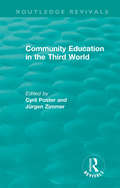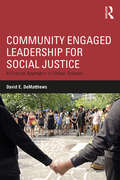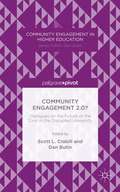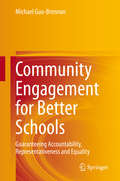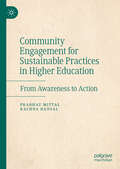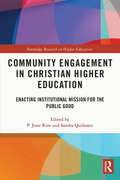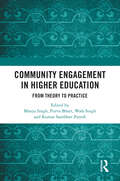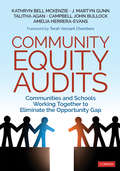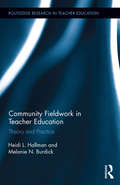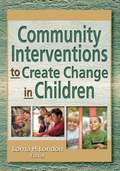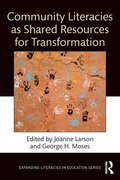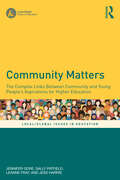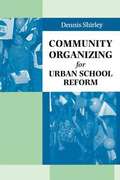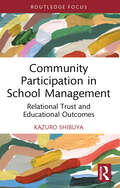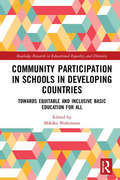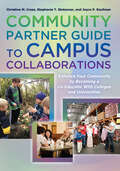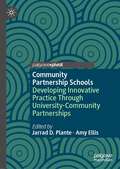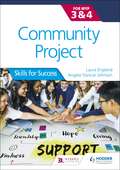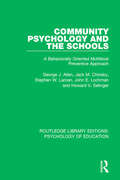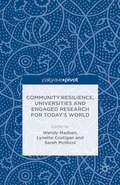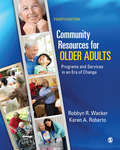- Table View
- List View
Community Education in the Third World (Routledge Revivals)
by Cyril Poster Jürgen ZimmerThis book, originally published in 1992, contains a wealth of experience in the development of community education from and about Third World countries. The influence of Paulo Freire permeates the work, although each country and continent has had to seek its own path and its own methodology. With contributions from a wide variety of countries – from Nigeria and Tanzania, Thailand and Korea to Mexico, Central America and Costa Rica – the book offers a framework in which theory and practice are mutually supportive.
Community Engaged Leadership for Social Justice: A Critical Approach in Urban Schools
by David E. DeMatthewsThis book advocates for informed leaders who are aware of the larger historical, political-economic, sociological, and philosophical issues that surround the schools and communities they serve. Extending beyond mainstream conceptions of instructional leadership and broad social justice paradigms, Community Engaged Leadership for Social Justice offers a multidisciplinary framework that helps leaders better serve the needs of their students, teachers, and communities. Exploring issues of urban school reform as it relates to the principal, as well as priorities that are relevant to the process of school improvement and the promotion of social justice, this book provides a critical, equity-oriented set of best practices grounded in research and empirical cases. This is a must-have resource for building consciousness, offering hope, and engaging in dialogical and collaborative leadership practices to radically transform schools and communities.
Community Engagement 2.0?: Dialogues on the Future of the Civic in the Disrupted University
by Scott L. Crabill Dan ButinAs higher education is disrupted by technology and takes place less and less on campus, what does meaningful community engagement look like? How can it continue to enrich learning? In Community Engagement 2. 0?, Crabill and Butin convene a dialogue: five writers set out theoretical and practical considerations, five more discuss the issues raised.
Community Engagement for Better Schools: Guaranteeing Accountability, Representativeness and Equality
by Michael Guo-BrennanIn the United States, government participation in education has traditionally involved guaranteeing public access, public funding, and public governance to achieve accountability, representativeness and equality. This volume discusses the role of broad regimes of local community actors to promote school improvement through greater civic engagement. Taking a historical perspective, this text examines the relationship between government at the federal, state, and local level and local actors both inside the traditional education regime and those stakeholders outside the schools including parents, non-profit organizations, and businesses. It then drills deeper into the role of state legislatures and finally local leadership both inside and outside the schools to promote change, focusing on efforts that include parental choice through tax incentives, charter schools, magnet schools, and school vouchers to achieve accountability, representativeness and equality.The text examines the perceptions and relationships of various actors in urban education reform in numerous cities across the country with special attention dedicated to Chicago, Illinois, and Milwaukee, Wisconsin to offer a deeper understanding of the barriers to and opportunities for fostering greater civic capacity and engagement in urban education reform, as well as developing inclusive educational policy.Attention is also given to accountability and measuring success, traditionally defined by high stakes testing which fails to consider non-classroom factors within the community that contribute to student performance. An alternative approach is offered driven by a wholistic accounting of various factors that contribute to school success centered around third-party inspections and accreditation.Providing insight into school reform at the local level, this book will be useful to researchers and students interested in public policy, education policy, urban governance, intergovernmental relations, and educational leadership, as well as teaching professionals, administrators, and local government officials.
Community Engagement for Sustainable Practices in Higher Education: From Awareness to Action
by Prabhat Mittal Rachna BansalThis book provides a deeper understanding of the concept of community engagement in higher education, encompassing crucial aspects such as stakeholder involvement, collaboration, community organization, and mobilization. It highlights the pivotal role of student engagement in promoting sustainable practices within higher education. The book goes beyond theory by showcasing real-world case studies and best practices from various institutions on successful student-led sustainability projects, campaigns, and initiatives. Furthermore, it uniquely highlights students' efforts in digitalizing communities, reflecting the relevance of technology in modern sustainability practices. It offers actionable insights to effectively engage students and empower them to translate their passion for sustainability into tangible actions. In doing so, the book equips readers to bridge the awareness-action gap, empowering students to implement sustainability practices in real life.
Community Engagement in Christian Higher Education: Enacting Institutional Mission for the Public Good (Routledge Research in Higher Education)
by P. Jesse Rine Sandra QuiñonesOriginally published as a special issue of Christian Higher Education, this volume showcases diverse forms of community engagement work carried out by faith-based colleges and universities throughout the US. Acknowledging the rise of community engagement as a contemporary expression of a longstanding civic impulse, Community Engagement in Christian Higher Education explores how religious mission and identity animate institutional practice across various forms of Catholic and Protestant Higher Education. Offering perspectives from faculty members, administrators, and community partners at nine different US institutions, chapters highlight effective initiatives that have been actively implemented in rural, urban, and suburban contexts to meet local needs and serve the public good. With a focus on practical community work, the text demonstrates the very concrete ways in which Christian values can inform and foster community engagement. This volume will be of interest to scholar-practitioners, researchers, and academics in the fields of higher education, sociology of education, religious education, and practical theology. More broadly, the text offers important insights for faith leaders and the faculty of faith-based institutions exploring issues of community, identity, and shared purpose.
Community Engagement in Higher Education: From Theory to Practice
by Manju Singh, Purva Bhatt, Wafa Singh and Kumar Sambhav PareekThis book explores the finer nuances of community engagement in Indian higher education, ranging from theory to practice. It contextualizes the concept and practice of community engagement in the contemporary context, capturing global experiences, insights and varied standpoints. The volume also identifies gaps present in the system and recommends solutions for the successful implementation and scaling up of the practice of community engagement not only in India but also at the global level. It also brings to the forefront; opinions, perspectives and experiences of stellar women and their valuable scholarship with the aim of addressing the gender gap in the field of knowledge production on community engagement. The book will be of interest to scholars, teachers and researchers of education, higher education and sociology of education. It will also be useful for academicians, think tanks, higher education administration, policymakers, civil society organizations, higher education institutions and those interested in the study of community engagement.
Community Equity Audits: Communities and Schools Working Together to Eliminate the Opportunity Gap
by Kathryn B. McKenzie Dr. J. Martyn Gunn Dr. Talitha Agan Dr. Campbell John Bullock Dr. Amelia Herrera-EvansBridge the gap in opportunity to overcome the gap in achievement! Although out-of-school factors that limit student success may seem like obstacles too big to address, this guidebook provides the necessary direction to bridge the opportunity gap and close the achievement gap. Step-by-step instructions on how to conduct a community equity audit, along with detailed case studies, activities, and discussion questions give readers the power to assess opportunity gaps and eliminate them. A community equity audit asks questions such as: • Do the children in my community have the same opportunity as children in other communities? • Does my community have the same resources as other communities? • If my community needs more resources how can we provide them?
Community Equity Audits: Communities and Schools Working Together to Eliminate the Opportunity Gap
by Kathryn B. McKenzie Dr. J. Martyn Gunn Dr. Talitha Agan Dr. Campbell John Bullock Dr. Amelia Herrera-EvansBridge the gap in opportunity to overcome the gap in achievement! Although out-of-school factors that limit student success may seem like obstacles too big to address, this guidebook provides the necessary direction to bridge the opportunity gap and close the achievement gap. Step-by-step instructions on how to conduct a community equity audit, along with detailed case studies, activities, and discussion questions give readers the power to assess opportunity gaps and eliminate them. A community equity audit asks questions such as: • Do the children in my community have the same opportunity as children in other communities? • Does my community have the same resources as other communities? • If my community needs more resources how can we provide them?
Community Fieldwork in Teacher Education: Theory and Practice (Routledge Research in Teacher Education)
by Heidi L Hallman Melanie BurdickIn teacher education, field work in community-based spaces (including foster homes and programs for homeless youth) is frequently contrasted with "traditional" field experiences in classroom settings, where beginning teachers are immediately introduced to teacher-centered models of instruction. This volume works against such a model, presenting a counter-narrative of new teachers’ understanding of the act of teaching. By exploring their work with at risk youth in community-based sites, the authors uncover how non-traditional spaces for teaching and learning have the potential to open new doors for reimagining the teaching act and teacher identity. This volume examines how prospective teachers have used writing within unconventional spaces as catalysts for considering what it means to become a teacher, as well as how the work of teaching can be conceptualized. It unites the practical aspects of field work and with theoretical conceptions of teaching, and envisions how the work and the definition of "teaching" can be broadened.
Community Focused Nursing: Passbooks Study Guide (Excelsior/Regents College Examination Series)
by National Learning CorporationThe Excelsior/Regents College Examinations (E/RCE) offer you an opportunity to obtain recognition for college-level learning and consists of exams designed to demonstrate achievement and mastery of various college-level subjects, such as the Arts and Sciences, Business, Criminal Justice, Education, Health and Nursing. The E/RCE Community Focused Nursing Passbook® prepares you by sharpening knowledge of the skills and concepts necessary to succeed on the upcoming exam and the college courses that follow. It provides a series of informational texts as well as hundreds of questions and answers in the areas that will likely be covered on your upcoming exam.
Community Interventions to Create Change in Children
by Lorna LondonHelp a child meet the challenges of the "real" world! Our children spend a significant amount of time in school, working to develop the skills they need to succeed in the "real" world. But more and more, they face social and emotional challenges that can't be effectively addressed during school hours. Community Interventions to Create Change in Children reflects the efforts by psychologists to work outside the classroom, combining research with action to produce community-based interventions that address the concerns children struggle with every day: bullying and victimization, prejudice, cross-cultural friendships, poverty, and homelessness. Community Interventions to Create Change in Children presents varied interventions, methodologies, and practices with diverse groups of children. Qualitative and quantitative methodologies are used with accompanying case studies as psychologists interact with children in settings as varied as public parks, summer camps, and Kid's College, a Chicago-based program that promotes positive race relations. The book includes articles on: effective mentoring practices traditional behavioral reinforcement with homeless children survival skills for urban youth cross-cultural friendships prejudicial attitudes and behaviors and much more! Community Interventions to Create Change in Children is an essential resource for psychologists, educators, counselors, and social workers committed to making a difference in the lives of children.
Community Literacies as Shared Resources for Transformation (Expanding Literacies in Education)
by Joanne Larson George H. MosesThrough multiple narratives reflecting the complexity of participatory action research partnerships for social justice, this book sheds light on the dialogic spaces that intentionally support community literacies and rhetorical practices for inquiry and change. Applying literacy as social practice, Larson and Moses tell a story of a unique collaboration between community members and university faculty and students, who together transformed an urban corner store into a cornerstone of the community. Building on the emerging field of community literacies, the book captures the group’s active work on the ground and, on another level, how transformation occurred in the dialogic spaces of the research team as it learned to embrace distributed expertise and multiple identities.
Community Matters: The Complex Links Between Community and Young People's Aspirations for Higher Education (Local/Global Issues in Education)
by Jess Harris Jennifer Gore Sally Patfield Leanne FrayWorking towards equity of access to higher education remains a fundamental issue of social justice. Despite substantial efforts to redress historical exclusions via a wealth of government and institutional policies, longstanding enrolment patterns persist and new forms of inequality have emerged in a deeply stratified system. Community Matters: The Complex Links Between Community and Young People’s Aspirations for Higher Education offers a new lens on equity of access. The policy focus, nationally and globally, on widening participation for under-represented target groups too readily treats such groups as if they have a singular voice, a singular history, and a singular set of concerns. Drawing on the perspectives of Australian school students, their parents/carers, teachers, and a vast array of residents from seven diverse communities, this book uses the lens of ‘community’ to reframe inequitable access. It does so by recognising the complex social and cultural forces at play locally that shape how young people form and articulate their post-school futures. In light of unprecedented challenges facing the higher education sector, this book interrogates dominant understandings of ‘widening participation’ and ‘aspiration,’ and offers timely insights about the broader economic, social, and cultural backdrop of aspiration formation. It is a valuable resource for academics and students interested in the sociology of higher education and for practitioners working at the forefront of equity policy and practice.
Community Organizing for Urban School Reform
by Dennis ShirleyCommunity Organizing for Urban School Reform tells the story of a radically different approach to educational change. Using a case study approach, Dennis Shirley describes how working-class parents, public school teachers, clergy, social workers, business partners, and a host of other engaged citizens have worked to improve education in inner-city schools. Their combined efforts are linked through the community organizations of the Industrial Areas Foundation, which have developed a network of over seventy "Alliance Schools" in poor and working-class neighborhoods throughout Texas. This deeply democratic struggle for school reform contains important lessons for all of the nation's urban areas. It provides a striking point of contrast to orthodox models of change and places the political empowerment of low-income parents at the heart of genuine school improvement and civic renewal.
Community Participation in School Management: Relational Trust and Educational Outcomes (Routledge Research in International and Comparative Education)
by Kazuro ShibuyaNobody denies that trust in schools is key to success in generating any educational outcomes. However, trust is often eroded, resulting in conflicts, alienation, and differentiation among school-level stakeholders. This book analyses school-based management (SBM) of education through the lens of relational trust in the context of Ghana, revealing how community participation in school management leads to educational outcomes. Conducting quantitative analysis of headteacher questionnaires from public basic schools and qualitative analysis of case study schools in the Akatsi South District of Ghana, Shibuya offers critical insights into building sustainable relationships between individual households and geographical/school communities. He argues it is critical to highlight relational trust as an analytical tool to examine relationships between actors and factors in school management. The research finds that trust in schools is a two-way mechanism, and the mutuality of expectations and obligations among stakeholders is essential if children’s learning outcomes are to improve. With its mixed-methods approach, this book will be a valuable resource for scholars in comparative education, those in educational development, and those interested in African contexts.
Community Participation with Schools in Developing Countries: Towards Equitable and Inclusive Basic Education for All (Routledge Research in Educational Equality and Diversity)
by Mikiko NishimuraThe Sustainable Development Goals (SDGs) (2016-2030) set by the United Nations in 2015 restated the importance of universal primary education for all, and specifically discuss quality, equity, and inclusion in basic education. To achieve this, the role of community has been emphasized and participation has become a "buzzword" in international development over the past several decades. Despite the growing attention to community participation in school management, previous literature has shown mixed results in terms of its actual practice and its impacts on quality, equity, and inclusion in education. This book deepens the contextual understanding of community in developing countries and its involvement in schools in general, and its impact on quality, equity, and inclusion of school education in particular. By presenting various case studies in Asia, Africa, Latin America, and a post-conflict state in Europe, the book analyses commonalities and differences in the ways communities are involved and cast their impacts and challenges. The book contributes knowledge on the ways in which community involvement could work in developing countries, the detailed processes and factors that make community participation work in different dimensions, and remaining challenges that scholars and practitioners still need to be concerned and mindful in the field. This book will appeal to both researchers and practitioners who are concerned about the community participation approach for the SDGs.
Community Partner Guide to Campus Collaborations: Enhance Your Community By Becoming a Co-Educator With Colleges and Universities
by Christine M. Cress Joyce P. Kaufman Stephanie T. Stokamer“Interacting with colleges can be confusing and frustrating. We learned the hard way through trial and error over the years. This Guide has great strategies for developing effective collaborations from the outset so that resources are leveraged for education and improvement.”—Sheila, Boys and Girls Club“VERY strong and well-written chapters with lots of gold that I think community organizations will find very helpful.”—Melia, Hands on Greater Portland“The format and visual cues make the Guide easy to scan for quick tips and ideas. Also, the information is comprehensive regarding research-based practices, but the writing is friendly and engaging for all non-profit sectors and community agencies. Lots of practical examples.”—Juan, Immigrant Empowerment* Discover Campus Resources for Identifying Volunteers and Service-Learners* Decode Confusing Language, Terminology, and Acronyms of Academe* Decipher Your Academic Partner’s Goals for Community-Based Learning and Research* Devise Empowering Learning and Serving Experiences for Students and Clients* Design Sustainable and Enriching Relationships for Enhancing CommunitiesBased upon years of field experience, this Guide is addressed to you, whether your non-profit has experience of working with university interns or volunteers but wants to deepen and increase the effectiveness of the relationship; whether your agency is starting to explore how to improve client services through a campus collaboration; or whether you work for an NGO interested in partnering with universities across borders to effect positive change and draw attention to the challenges, resources, and needs of your community. This Guide offers insights and strategies to leverage student learning and community empowerment for the benefit of both parties. Recognizing both the possibilities and the pitfalls of community-campus collaborations, it demystifies the often confusing terminology of education, explains how to locate the right individuals on campus, and addresses issues of mission, expectations for roles, tasks, training, supervision, and evaluation that can be fraught with miscommunication and misunderstanding. Most importantly it provides a model for achieving full reciprocity in what can be an unbalanced relationship between community and campus partners so that all stakeholders can derive the maximum benefit from their collaboration.This Guide is also available in sets of six or twelve, at reduced prices, to facilitate its use for planning, and for training of leaders engaged in partnerships.The Community Partner Guide to Campus Collaborations Six Copy Set978-1-62036-271-6, $87.00The Community Partner Guide to Campus Collaborations Twelve Copy Set978-1-62036-272-3, $150.00
Community Partnership Schools: Developing Innovative Practice Through University-Community Partnerships (Rethinking University-Community Policy Connections)
by Jarrad D. Plante Amy EllisThis book examines community partnership schools in the USA. Authored by academics and practitioners, it provides an overview of how community schools work in practice, provides a historical context of the model, and demonstrates the importance of the university-community connection in their effective running. Above all, the book showcases how community partnership schools are educational equity solutions that provide support services to underserved students, families, and communities. It will appeal to students and scholars of public administration, public policy, public health, and education, as well as practitioners.
Community Project for the IB MYP 3-4: Skills for Success
by Laura England Angela Stancar JohnsonBecome an independent, lifelong learner and feel supported through the Community Project, while strengthening and practising your ATL skills. - Engage in practical explorations through a cycle of inquiry, action and reflection. - Build ATL skills with strategies, detailed examiner advice, expert tips, and infographics in every chapter for visual learners. - Clarify IB requirements with concise and clear explanations, including assessment objectives and rules on academic honesty. - Foster the attributes of the IB learner profile with explicit reference made throughout to link with your research. - Progress independently through your Community Project with advice, tips and common mistakes to avoid.
Community Project for the IB MYP 3-4: Skills for Success
by Laura England Angela Stancar JohnsonBecome an independent, lifelong learner and feel supported through the Community Project, while strengthening and practising your ATL skills. - Engage in practical explorations through a cycle of inquiry, action and reflection. - Build ATL skills with strategies, detailed examiner advice, expert tips, and infographics in every chapter for visual learners. - Clarify IB requirements with concise and clear explanations, including assessment objectives and rules on academic honesty. - Foster the attributes of the IB learner profile with explicit reference made throughout to link with your research. - Progress independently through your Community Project with advice, tips and common mistakes to avoid.
Community Psychology and the Schools: A Behaviorally Oriented Multilevel Approach (Routledge Library Editions: Psychology of Education)
by John E. Lochman George J. Allen Jack M. Chinsky Stephen W. Larcen Howard V. SelingerOriginally published in 1976, this volume begins with a theoretical overview of the major trends in the community psychology movement at the time, as well as a perspective on how the field was developing. The emphasis is on the utility of combining a preventative community-centered orientation with an applied behavioral-analytic focus. The authors take general theoretical notions and demonstrate how they can be turned to concrete methods of dealing with specific practical problems that occur in implementing a ‘real-life’ program of community oriented intervention. The authors present an innovative model for developing a low cost and effective delivery system for mental health services in public schools. They describe the actual development and implementation of such a system in the school, and also include a comprehensive evaluative scheme for determining the efficacy of this type of endeavor. The actual behavior change strategies that are employed can be used effectively by teaching personnel or psychologists on either a large or small scale. A final unique feature of the volume is the inclusion of a program that will assist teachers and mental health professionals in helping elementary school students learn social problem-solving skills.
Community Resilience, Universities and Engaged Research for Today’s World
by Sarah Mcnicol Wendy Madsen Lynette CostiganThe increasing development of partnerships between universities and communities allows the research of academics to become engaged with those around them. This book highlights several case studies from a range of disciplines, such as psychology, social work and education to explore how these mutually beneficial relationships function.
Community Resources for Older Adults: Programs and Services in an Era of Change
by Professor Robbyn R. Wacker Dr Karen A. RobertoCommunity Resources for Older Adults: Programs and Services in an Era of Change, Fourth Edition, by Robbyn Wacker and Karen Roberto, provides an in-depth review of policy and programs for the "aging network," answering such key questions as "How have programs for older adults evolved?" "Who uses these resources?" "How are they delivered?" and "What challenges do service providers face in meeting the needs of the aging baby-boom generation?" To give students the foundational knowledge they need to meet the needs of their older clients, the authors provide a theoretical framework for understanding the forces that shape older adults' likelihood to seek assistance, include in-depth reviews of the current body of empirical literature in each program area, and discuss the challenges programs and services will face in the future.
Community Resources for Older Adults: Programs and Services in an Era of Change
by Professor Robbyn R. Wacker Dr Karen A. RobertoCommunity Resources for Older Adults: Programs and Services in an Era of Change, Fourth Edition, by Robbyn Wacker and Karen Roberto, provides an in-depth review of policy and programs for the "aging network," answering such key questions as "How have programs for older adults evolved?" "Who uses these resources?" "How are they delivered?" and "What challenges do service providers face in meeting the needs of the aging baby-boom generation?" To give students the foundational knowledge they need to meet the needs of their older clients, the authors provide a theoretical framework for understanding the forces that shape older adults' likelihood to seek assistance, include in-depth reviews of the current body of empirical literature in each program area, and discuss the challenges programs and services will face in the future.
